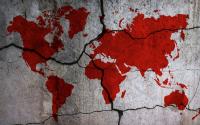13 October 2006John Ward Anderson
The complex relationship between Turkey and Europe played out Thursday in two European capitals, as Turkey's leading novelist was awarded the 2006 Nobel Prize in literature in Stockholm and French lawmakers here passed a bill that would make it a crime to deny that Ottoman Turkey committed genocide against Armenians during and after World War I.
The hotly disputed issue of genocide against the Armenians was bound to explode when Orhan Pamuk -- who has complained that Turkey has refused to admit that as many as 1.5 million Armenians were massacred beginning in 1915 -- became the first Turkish writer to win the Nobel. But the nearly simultaneous vote by France's National Assembly added a political sting that could damage relations between France and Turkey and further weaken Turkey's bid for membership in the European Union.
The French bill, approved 106 to 19, provides for up to one year in jail and a fine of about $57,600 for anyone who denies that genocide occurred. The measure faces several hurdles before becoming law.
Turkey acknowledges the deaths of tens of thousands of Armenians from 1915 to 1923 but says they occurred in clashes after the Armenians allied themselves with Russian forces invading the collapsing Ottoman Empire. Although independent scholars generally agree that genocide occurred, the Turkish government has long denied it.
Pamuk was charged last year with "public denigrating of Turkish identity" after telling a Swiss newspaper that Turkey was unwilling to confront the darkest chapters of its past. "Thirty thousand Kurds and 1 million Armenians were killed in these lands, and nobody but me dares to talk about it," he said in the interview.
People opposed to E.U. membership for Turkey used Pamuk's ensuing trial to attack the country's human rights record. Charges against him were dropped in January on a technicality.
Although Turkish artists and writers said Pamuk's selection for the Nobel award signaled the emergence of Turkish literature as a genre, several commentators and analysts said that in awarding the prize to Pamuk, the Swedish Academy was clearly motivated by a political agenda to highlight Turkey's human rights record.
"I think there's a political message," said Charles Grant, head of the Center for European Reform in London. "Pamuk is not popular even with the educated, liberal intelligentsia in Turkey, where there is a view that he is out of touch with his Turkish roots. And this is not going to make him any more popular."
But the head of the Swedish Academy, Horace Engdahl, denied political motives. "We are not interested in that," Engdahl told reporters. "He is a controversial person in his own country, but on the other hand, so are almost all of our prizewinners."
In France, which is home to about 500,000 ethnic Armenians, the legislation passed Thursday reflected continuing apprehension over possibly admitting Turkey to the European Union. Concerns that Turkey is too big, too poor and too Muslim to join the 25-nation bloc were largely to blame for the rejection of the proposed E.U. constitution by voters in France and the Netherlands last year.
Turks bristled at the new French legislation, with a group of lawmakers in Ankara retaliating by proposing an "Algerian genocide" law to highlight the killings of Algerians under French colonial rule. That bill was withdrawn, with Turkish Prime Minister Recep Tayyip Erdogan telling lawmakers, "We do not clean filth with filth."
In a statement, Turkey's Foreign Ministry said that Turkish-French relations "have been dealt a heavy blow as a result of the irresponsible behavior of a group of French politicians who are incapable of comprehending the result of their policies."
"I think the French Parliament is absolutely ridiculous to pass a law about Armenian massacres," said Grant, of the Center for European Reform. "So many massacres have been carried out by so many people throughout history that to pass a law about one and not the others . . . is infantile."
The bill must clear the French Senate and be signed by President Jacques Chirac to become law.
Although Chirac said recently that Turkey should acknowledge the mass killing of Armenians as genocide before joining the E.U., he also said the genocide bill was more of a "polemic" than a "legal reality," raising the question of whether he would sign it.
A French Foreign Ministry spokesman said Thursday that the bill "doesn't seem necessary," while France's minister for European affairs, Catherine Colonna, said that the government did not favor the bill because "it is not for the law to write history."






